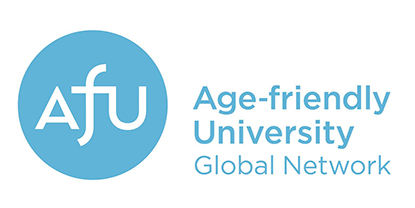St. Cloud State University is the latest institution to join the Age-Friendly University Global Network as an Age-Friendly University.

The Age-Friendly University Global Network is a group of 88 higher education institutions around the world that are committed to becoming more age-friendly in programs and policies and create opportunities for an aging population.
The institutions have a shared goal of promoting an inclusive approach to healthy and active ageing through research, enhanced learning opportunities for people across generations, and innovations that address issues affecting older adults.
“I am thrilled with this designation as it signals to our campus and greater community that we are intentional in thinking about how to relate to an increasing number of older adults in our region and beyond,” said President Robbyn Wacker. “This is an opportunity that aligns with our It’s Time initiative in that we are considering ways to become more inclusive as we explore the educational needs, appropriate teaching practices, and new engagement opportunities for this emerging population.”
To become an Age-Friendly University, St. Cloud State had to demonstrate a commitment to working toward the 10 age-friendly university principles. An initial assessment of the campus social, physical, and academic environments has been conducted the university is moving forward on a number of initiatives to keep moving toward these goals.
St. Cloud State’s efforts to become a more age friendly institution are supported by a $10,000 Small Seed grant from the Minnesota State Educational Innovations. The grants support projects that show great potential for improving teaching, learning and access to students across the Minnesota State system. The work is being led by Gerontology professors Dr. Rona Karasik and Dr. Phyllis Greenberg.
“Becoming an Age-Friendly University has many benefits for all students in that it will encourage more intergenerational interactions and better prepare students to work and engage with older adults when they enter the workforce,” Greenberg said. “Working towards being an Age-Friendly University not only impacts interactions between students but faculty and staff as well. It will also enhance the relationships between SCSU and the larger St. Cloud Area community and beyond.”
Age-friendly improvements also align with the It’s Time initiative’s effort to extend the university’s reach to make higher education more accessible to more students by providing individualized student support. It honor’s Gov. Tim Walz’ commitment to make Minnesota an age-friendly state as Minnesota state’s population ages. By 2030 Minnesotan’s 65 and older are predicted to make up more than 25% of the state’s adult population, according to Face Aging Minnesota.
Beyond making St. Cloud State a campus that is welcoming for all ages, the Age-Friendly focus is important for all campus programs, Karasik said.
“Our goal is to break down age barriers,” Karasik said. “Locally, nationally and globally, the demographics are shifting toward an older population who is healthy and engaged.
“One of our biggest challenges is ageism, and the belief that older people are all alike and somehow inherently different from other age groups. We hope this initiative will help to dispel these myths and stereotypes. Aging isn’t “them” – it is all of us! Longer, healthier life expectancies is progress – not a problem.”
An aging population offers opportunities in every field – ranging from health and human services to travel & tourism, arts and humanities, education, science and engineering, business and marketing, community planning and design, and so forth – the possibilities to design products and services that benefit people of all ages is in high demand, she said.
About the Age-Friendly University Global Network
The Age-Friendly University Global Network started in Dublin where educators developed the 10 principles concept.
The 10 principles are active in all aspects of a university to support older adults seeking education for career development or second careers, to widen access to online education and expand activities available on campus for older adults. The network is about universities responding to the increased complexity of aging and meeting the needs of older adults.
Members of the Age-Friendly Global Network adopt the 10 principles and strive to work toward implementing all 10 to make their campuses more welcoming for students of all ages.
10 Age-Friendly University Principles
- To encourage the participation of older adults in all the core activities of the university, including educational and research programs.
- To promote personal and career development in the second half of life and to support those who wish to pursue second careers.
- To recognize the range of educational needs of older adults (from those who were early school-leavers through to those who wish to pursue Master’s or Ph.D. qualifications).
- To promote intergenerational learning to facilitate the reciprocal sharing of expertise between learners of all ages.
- To widen access to online educational opportunities for older adults to ensure a diversity of routes to participation.
- To ensure that the university’s research agenda is informed by the needs of an aging society and to promote public discourse on how higher education can better respond to the varied interests and needs of older adults.
- To increase the understanding of students of the longevity dividend and the increasing complexity and richness that aging brings to our society.
- To enhance access for older adults to the university’s range of health and wellness programs and its arts and cultural activities.
- To engage actively with the university’s own retired community.
- To ensure regular dialogue with organizations representing the interests of the aging population.
About the Gerontology program
St. Cloud State University offers a master’s degree, graduate certificate and a minor in Gerontology. Students come to the program from a variety of fields.
Gerontology is inherently inter-disciplinary because older adults have a variety of interests and areas of involvement.
Outside of the health and human services professions, a degree or minor in Gerontology pairs well with majors or careers in hospitality, tourism, economics, design and sustainability.
